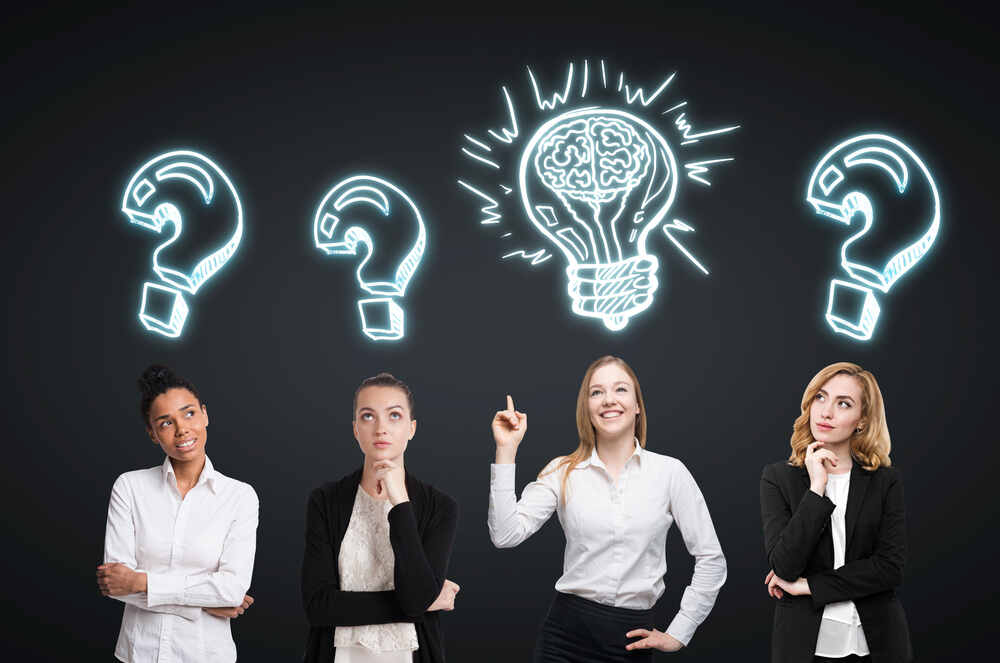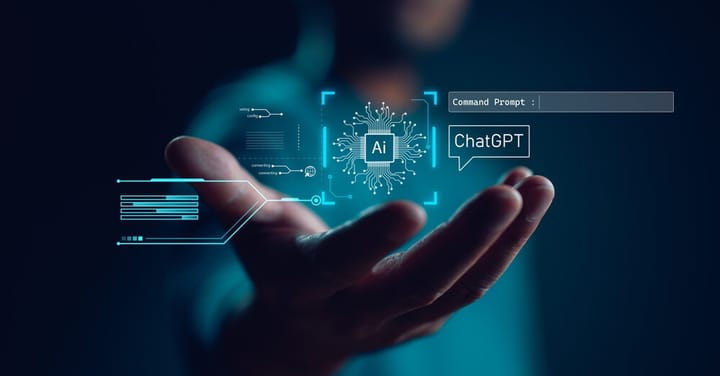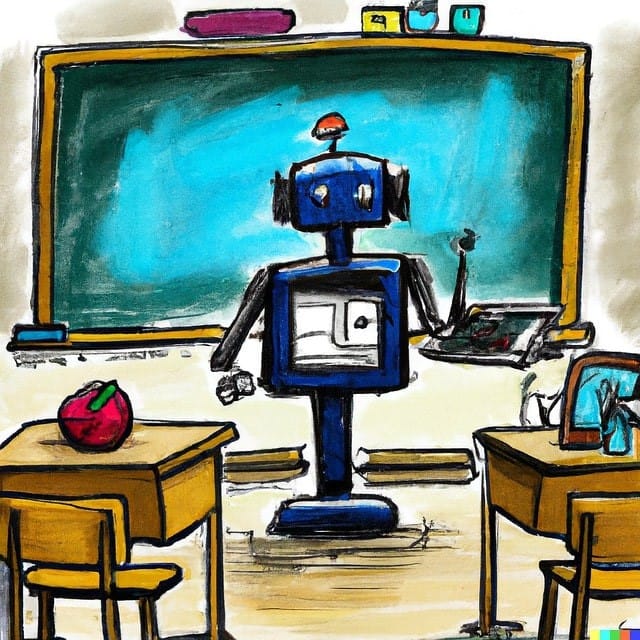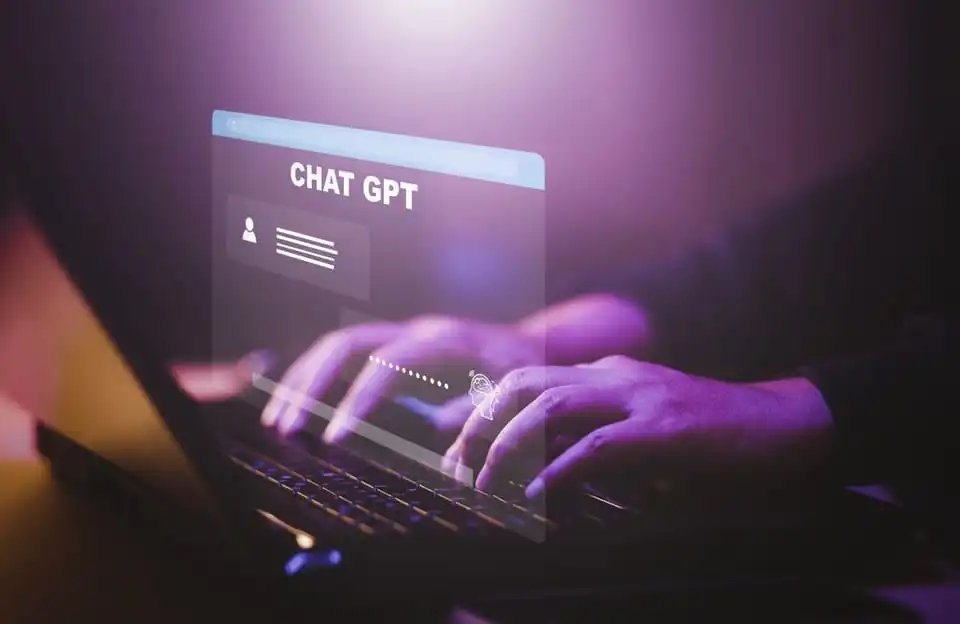ChatGPT: The Future of Human-AI Interaction
Unlock the power of AI language with ChatGPT! Discover the limitless potential of this groundbreaking technology, capable of generating human-like responses and revolutionizing the way we communicate. From personalized customer service to creative writing assistance, ChatGPT is changing the game.

Only two months after its launch, ChatGPT set a record for the fastest user growth when it reached 100 million active users in January. The impact of this technology is enormous, forcing big companies like Google and Meta to reroute whole teams to focus on commercializing their own AI research and forcing academic institutions all over the globe to race to develop a way to identify the usage of ChatGPT.
For those who don't know, OpenAI, a research center founded by some of the biggest names in technology, including Sam Altman, Elon Musk, Reid Hoffman, and Peter Thiel, unveiled ChatGPT, a chatbot which has gotten much attention because of its wide variety of skills, including writing essays and serving as a coding partner, responding to queries, and following up on related ones. The GPT-3, a large language model from OpenAI, is one of the most sophisticated language models ever published in 2020 and serves as the basis for ChatGPT. GPT-3 is also recognized as a core model since ChatGPT, DALL-E, and Codex, three of OpenAI's consumer AI products, are built on top of it. GPT-3, the third iteration of the language model, made its debut in 2018, and was incredibly large compared to GPT-2, increasing from 1.5 billion to 175 billion deep learning parameters.
GPT-4 is the fourth in OpenAI's GPT series, a generative AI based large language model (LLM). It was released on March 14, 2023, and is now publicly available in a limited form through ChatGPT Plus, with access to its commercial API available through a waitlist.
ChatGPT: Usage, Statistics and Estimated Revenue
In just two months, ChatGPT became the fastest app to 100 million active users, breaking previous records. OpenAI, most recently valued at $29 billion in a $10 billion financing round by Microsoft, forecasts that ChatGPT would generate $200 million in 2023 and $1 billion in 2024. In 2022, it reportedly earned less than $10 million.
Breaking Down the Genius of ChatGPT: A Deep Dive into the AI Language Model
If you still don't know what is Chat GPT read on. ChatGPT is a generative AI language model that uses deep learning neural networks to generate human-like responses to a given input text prompt. Generative AI refers to a type of artificial intelligence that is capable of creating new content, such as images, text, or audio, that is similar to or in some cases indistinguishable from content created by humans. This is achieved through the use of machine learning algorithms that are trained on large datasets of human-generated content. It uses a neural network architecture known as a transformer to generate human-like text based on a given input prompt. ChatGPT is capable of generating text in a wide range of styles and on a variety of topics, and has been used for applications such as language translation, summarization, and even writing creative fiction.
The way ChatGPT works is by first being trained on a massive corpus of text data, such as books, articles, and web pages. During this training process, the neural network learns the patterns and structures of language, as well as the context and meaning of words and phrases. Once trained, ChatGPT can be used to generate responses to a given text prompt, based on its learned knowledge of language and context.
One of the main advantages of ChatGPT's generative AI approach is that it allows for more open-ended conversations that can go beyond pre-programmed responses. For example, if you were to ask ChatGPT "What is your favorite color?", it would be able to generate a unique response based on what it has learned from its training data.
Another example of generative AI in action is the use of GPT-3 to generate news articles, which has been demonstrated by OpenAI themselves. These articles are not written by humans but rather by the AI model itself, which is able to generate coherent and relevant content based on the given prompt.
The Rise of ChatGPT: A Game-Changing AI Language Model
AI and the more specific field of machine learning (where software learns better at a task with experience) are already used to personalize the recommendations we receive while shopping online with digital assistants like Alexa and for automatic text translation. The use of this technology will continue to grow. Companies have employed AI in various inventive ways, which may indicate how people may use futuristic technology. The AI-based chatbot ChatGPT is one such instance. Microsoft recently invested US$10 billion (£8.2 billion) in the parent company of the chatbot, highlighting how quickly these online tools are being taken.
Several media outlets thought it to be the start of an "AI war" between Google and Microsoft. The latter company has begun integrating AI into its search engine to enhance the replies customers obtain. Another cutting-edge AI application is Jasper.ai. This free resource generates written content for blogs, social media posts, and letters.
Facebook's parent firm, Meta, is creating AI-powered software to make films from text cues like "teddy bear painting a picture" in the interim. It is an improvement over text-to-image internet tools like DALL-E and Stable Diffusion.

12 Versatile Applications of ChatGPT: From Chatbots to Creative Writing
We have listed a few examples of how ChatGPT is being used in different ways. As an AI language model, its potential uses are practically limitless.
1. Chatbots and Customer Service
ChatGPT can be integrated into chatbots to provide customer service for businesses. This allows customers to interact with a bot and get their queries answered without needing human intervention. Many companies use ChatGPT in this way to handle customer queries, provide recommendations, and offer personalized services. Companies like Meta, Canva, and Shopify, currently use ChatGPT technology in their chatbots for customer support.
2. Language Translation
ChatGPT can be used for language translation, where it can convert text from one language to another with high accuracy. The interactive nature of ChatGPT make it even more useful for businesses that operate in multiple countries and need to communicate with customers in different languages.
3. Content Generation
ChatGPT can be used to generate content for websites, blogs, and social media. It can create unique and relevant content on any topic, which can save time for businesses and individuals who need to create a lot of content. ChatGPT is a fantastic tool for conducting research and attempting to consider other viewpoints and opinions when writing content. You may ask it to refute your perspective, provide more information on why your idea might not be valid, or even reword it for a new audience.
4. Creative Writing
ChatGPT can be used to generate creative writing pieces such as short stories, poems, and scripts. It can be a useful tool for writers who are experiencing writer's block or need inspiration. As ChatGPT continue to advance, it will be intriguing to observe how the roles of human creators and AI co-creators change across all types of creative expression. The issue of authorship is another concern when employing AI technologies like ChatGPT for creative projects. Harvard's Jack Cushman has conducted an intriguing yet critical analysis of ChatGPT's capacity to write creatively.
5. Education
ChatGPT can be used as a tool for education, helping students with their homework or assisting teachers in creating educational content. It can provide explanations of complex concepts and help students learn more effectively. ChatGPT is a strong research tool that can let students create, collaborate, present, and conduct learning pod workshops.
6. Personal Assistants
ChatGPT can be used as a personal assistant to help individuals with daily tasks such as scheduling appointments, making reservations, and setting reminders. You may improve the quality of your emails, postings, and comments by using ChatGPT-based virtual assistants. ChatGPT-based personal assistant apps may provide answers in a pleasant and engaging manner.
7. Mental Health
ChatGPT can be used as a tool for mental health by providing support and advice to individuals who may be struggling with mental health issues. It can also be used to identify individuals who may be at risk of mental health problems and provide early intervention. The rise of generative AI has sparked debates about technology's role in mental health, and some individuals are currently using chatbots as therapists.
8. Legal Services
ChatGPT can be used to provide legal services by answering legal queries, drafting legal documents, and providing legal advice. This can be useful for individuals who cannot afford the services of a lawyer. The AI-powered technology can streamline research and content generation, and ensure compliance with professional guidelines. Chat GPT can also provide valuable insights into complex legal topics, making it an invaluable asset for legal professionals.
On the other side, Northwestern Law’s High Tech Law Society, discussed potential and limitations of ChatGPT in Law and Legal services delivery. Harvard Center on the Legal Profession, discussed in detail the use of ChatGPT in legal industry along with its potential limitations.
9. Financial Services
ChatGPT is leading the way in the new era of Artificial Intelligence, affecting all industries including Financial Services. Next-generation generative language models offer many opportunities for financial institutions, such as improved customer service, AML and KYC compliance, loan origination, compliance monitoring, and personalized customer experiences. These innovations will enhance productivity, streamline operations, and improve services in the Financial Services industry.
ChatGPT can be used to provide financial advice and assist with financial planning. It can help individuals make investment decisions, manage their finances, and provide information on financial products and services. Insider Intelligence released a report discussing how generative AI may impact the financial services industry. The report highlights promising and less promising use cases and suggests ways providers can prepare for its implementation.
10. Gaming
People are excited about the potential of using ChatGPT to develop games since the release of OpenAI's GPT-4 model. AI technology is already being used by game developers and enthusiasts to recreate classic games and generate story ideas and dialogue. Some game studios are also exploring the use of advanced AI for writing game dialogue. Netease has integrated ChatGPT into its new video game, Justice Online Mobile, allowing players to have unpredictable text conversations with NPCs in the game.
ChatGPT can be used to create intelligent NPCs (Non-Playable Characters) in video games. These NPCs can provide players with helpful tips and hints, or engage in more complex dialogue to add to the player's gaming experience. GPT-4 is more advanced than its predecessor, ChatGPT, and can handle more complex instructions. A digital designer used GPT-4 to create a version of Snake in under 20 minutes, demonstrating the tool's potential for game development.
11. News and Media
ChatGPT can be used to create news articles, summaries, and digests for news and media outlets. It can also be used to generate headlines, captions, and social media posts. The publisher of Daily Mirror and Daily Express is considering using ChatGPT, an AI chatbot, to help write short news stories. They are exploring ways to use AI as media organizations look for innovative ways to use technology. The company has set up a working group to examine how the tool can assist human reporters compile local weather and traffic coverage.
12. Marketing and Advertising
ChatGPT can be used by marketing agencies in several ways: generating ideas, curating copy, spotting trends, search engine optimization, and personalization. It can suggest content ideas, fill in blanks and extend copy, synthesize articles, identify commonalities in comments, and create relevant hooks and captions for content. It can also be used to generate slogans and taglines, and to create personalized advertising messages for individual customers based on their preferences and past behavior.


ChatGPT Benefits and Drawbacks
That is an impressive accomplishment. During the past few years, Large Language Models, including earlier GPT versions, have improved steadily, but we don't believe anyone anticipated ChatGPT to perform at this level so quickly.
Benefits
The potential for disruption is enormous.
- Positively, it may be applied to improve our work.
- Instead of trawling through several Google results, we can use it in conversation to ask questions and receive concise replies.
- Instead of beginning from scratch, software engineers are already utilizing it to produce boilerplate code.
- Recently, a software developer claim that he is no longer required to know the syntax. After asking ChatGPT to build a program in any language, he only has to make minor tweaks. Not long ago, all of them were considered AI frontiers.
Drawbacks
- Negatively, it can undoubtedly be abused.
- It offers clear, confident—and perhaps overconfident—answers that might not be completely accurate.
- The ramifications of creating fake scientific papers or news reports exceeding those of useful research or media are horrifying and might have catastrophic effects on civilization.
Top 5 Free Online Courses in 2023 For Learning ChatGPT And AI
Technology has become a part of this rapidly changing world in practically every area. Whether we discuss the media, tech firms, or any small neighborhood company, AI and ChatGPT have quickly gained traction, and practically every organization utilizes ChatGPT in some capacity.
IT giants Microsoft and Google want to introduce their chatbots to compete in the market. Hence, in the modern day, everyone must pick up some skills to flourish in their careers and use artificial intelligence wisely. Unexpectedly, many online courses are accessible to teach novices how to utilize well-known chatbots like ChatGPT and get started with AI.
Access to even the most well-liked online courses is free. Thankfully, you don't need a promo code if you decide to enroll in one of these online courses, but you won't be able to contact the teacher personally or receive a completion certificate.
The top 5 free online AI and ChatGPT courses you should take by 2023 are listed here.
1. Creating And Promoting ChatGPT Side Jobs
With the aid of ChatGPT, you may generate great content for your side business. Whether you run a blog, create material, or manage social media. You can write compelling, well-written, and customized content that will draw your audience in with the help of the robust ChatGPT.
The course covers a broad range of subjects, including:
- Creating website content: to produce blog entries, product descriptions, and other website material of the highest caliber.
- Making social media posts: Learn how to utilize ChatGPT to make posts interesting to read and share.
2. How to Create Intelligent Bots
You will be able to learn how to examine corporate goals to find chatbot potential in this course. Use decision trees to see and design conversational faults. With the user-friendly, drag-and-drop chatbot building tool from Landbot, you can create an interesting, targeted chatbot.
3. Getting Ready for an AI Career
You will learn how to upskill your profession in AI and utilize AI responsibly and ethically in this course. You will also discover how to educate yourself about AI.
4. Human-Level Artificial Intelligence
Building an AI, creating a hybrid intelligent system, fully connected neural networks, autoencoders, mixed density networks, policy gradients, genetic algorithms, meta-learning, and deep neuro evolution are all skills that may be learned in this course.
5. For Business Professionals: AI Foundations
This course offers an extensive introduction to AI and a foundation in AI. The many forms of data, their sources, and how they are transformed into "intelligence" by AI systems. The fundamental ideas guiding machine learning and deep learning techniques underpin the current wave of AI applications.
Common Questions and Answers about ChatGPT
What is the purpose of ChatGPT?
ChatGPT is a long-form question-answering AI designed to answer complex questions conversationally and provide accurate and informative responses. It's created by OpenAI and can explain difficult physics concepts, write lines of code or summarize news articles, among other things. It's a powerful tool that is changing the way people use search engines by delivering answers to challenging queries.
Is ChatGPT a musician?
No, ChatGPT is not a musician. ChatGPT is a language processing tool powered by OpenAI’s GPT (Generative Pre-trained Transformer) model. It is designed to generate human-like responses to natural language inputs. ChatGPT can be used in various applications, including customer service chatbots, personal assistants, and language translation services. Despite its advanced technology, ChatGPT does not possess the skills or abilities of a musician. It can help compose music, but it doesn't have a physical body or any musical abilities.
Can ChatGPT produce a research paper?
While ChatGPT can generate highly sophisticated, grammatically correct, and coherent text, it's not a substitute for research or critical thinking. It can generate ideas, draft paragraphs, or write summaries, but it's still up to the researcher to select and analyze the sources, draw conclusions, and present original insights. Therefore, it's not advisable to rely solely on ChatGPT to produce a research paper, and it's necessary to complement its outputs with thorough research, peer-review, and ethical considerations.
Does the Wharton MBA Final Exam that ChatGPT Passed Raise Any Concerns About Plagiarism Or Cheating in Particular?
Plagiarism is a small matter compared to the cost to society of a graduate with degrees but no practical skills. Assume that most people choose to complete their task by utilizing generative models like ChatGPT. ChatGPT gains knowledge by examining human-generated data. The availability of new human-produced knowledge we use to train the models will be impacted if we depend too much on these models to generate knowledge.
Most significantly, we must consider whether our ultimate objective is to be uninspired drones receiving answers from machines or to push our boundaries and continue the journey of discovery while utilizing our tools to aid rather than replace us.
Are There Proper Standards or Laws in Place Today to Offer Checks on AI for Safety?
Congressional inquiries concerning ChatGPT's effects on national security and education also caught their attention. The regulations could be more cohesive and fragmentary when governing AI in the US. At the federal level, there needs to be more comprehensive; further restrictions are anticipated to surface this year.
The issue with these rules is that they frequently focus on certain use cases while ignoring the overall situation. To enable yearly monitoring of these systems against prejudice, for instance, a few jurisdictions recently enacted regulations surrounding automated employment decision tools (AEDT). The issue is that bias in the data would be horrible in many situations, automated employment tools being only one of them.
Biased data may have disastrous effects in various situations, including the employment of AI in courtrooms, healthcare diagnosis, advertising, and credit and mortgage evaluations. The regulation should address the issue of prejudice in general, but to do so, the regulators must have a deeper understanding of these problems.
Representative Ted Lieu, a Democrat on the House of Representatives Science Committee, stated in a recent opinion piece in the New York Times that he was both "excited about AI" and "freaked out by AI, specifically AI that is left unchecked and unregulated," in addition to the "incredible ways it will continue to advance society."
When asked how it should be controlled, ChatGPT itself ducked the question and responded:
“As a neutral AI language model, I don't have a stance on specific laws that may or may not be enacted to regulate AI systems like me.”
But, it continued by listing potential regulatory priorities, including data privacy, bias and fairness, and openness in answering questions.
Are countries banning ChatGPT?
When OpenAI's ChatGPT was abruptly made available to the public in November 2022, it instantly became a hit on the internet as people experimented with its rapid-fire capacity to produce computer code, essays, articles, and poetry.
ChatGPT has already been prohibited in schools and institutions worldwide because of concerns about plagiarism. According to American media sources, ChatGPT has already been outlawed in several public schools in Seattle and New York City, and a number of American institutions have announced intentions to replace take-home tests with more oral exams and hand-written essays. Moreover, students are not permitted to use ChatGPT at RV University in Bengaluru, India, and those who are suspected of doing so may be subject to spot inspections and requests to retake their work.
Under the threat of expulsion, Sciences Po, one of France's premier colleges, has outlawed the usage of ChatGPT to combat fraud and plagiarism. Sciences Po stated that "without visible referencing, students are prohibited from using the program for the production of any written work or presentations, save for defined course reasons, under the supervision of a course leader," though it did not say how it would keep track of usage.
The University of Hong Kong (HKU) became the first and only university in the metropolitan area to temporarily prohibit students from utilizing the ChatGPT or other AI-based tools for coursework, classwork, or assessments. Upon announcing the prohibition via student emails, Professor Ian Holliday, HKU's vice president of teaching and learning, noted that creating a long-term policy on AI technologies would take some time.
So, we need to adopt a short-term policy as a temporary measure. We are banning the use of ChatGPT or any other AI-based tools for all classroom, coursework, and assignments at HKU.
According to Holliday, if students wish to use AI-based programs, they must first have the instructor's written permission. Otherwise, any infringement might be seen as possible plagiarism. Teachers can contact students to review assignment performance, demand an extra-oral test or supplementary in-class exam, and take other actions if there is a suspicion of a violation.
Is Any Tool Effective in Detecting ChatGPT Written Content?
Yes, some tools can detect whether a piece of text was written using GPT or not. One such tool is GPT-2 Detector, which uses machine learning algorithms to analyze a given text and determine if it resembles the writing style of GPT. Another option is GPT-3 Game, which presents certain prompts and analyzes how the text is completed to determine if it was written using GPT-3. However, these tools may not be 100% accurate in determining whether GPT generated a piece of text.
ChatGPT Common Errors and Fixes
We have addressed some of the common errors that you may encounter while working with ChatGPT.
- What is Chat GPT Internal Server Error and How to Fix it?
- Chat GPT Not Working. How to Fix it?
- What was Chat GPT Offline Error, and How Long it Stayed?
- Chat GPT is at Capacity. What Does it Mean?
- Why am I Facing ChatGPT Can’t Log in Error?
- What Does ChatGPT Error in Body Stream Mean and How to Fix it
- What are the Tips to Deal with ChatGPT is at Capacity Right Now Error
- Why is My ChatGPT Login Not Working?
- What is ChatGPT Network Error?
- Why I’m Facing Error Code 1020 ChatGPT and How to Fix It?
- How to Log onto ChatGPT?
- Why Is Chat GPT Always Down
Tool to Identify Text Produced By AI
Everyone's concerns have been acknowledged, and OpenAI is now making progress in identifying AI-generated text. The makers of ChatGPT have created a tool to assist in identify text produced by AI.
Due to its expert writing and engineering skills, the company's explosive AI chatbot, ChatGPT, has generated waves in numerous sectors since its inception. The bot has already performed several remarkable achievements, including completing four law school courses, the Wharton MBA test, and the US Medical Licensure Exam.
Teachers and other education experts worry about ChatGPT because they believe the bot will teach pupils how to cheat and plagiarize more effectively.
The business released a web application named "AI Text Classifier" to address that problem.
Pasted text will be marked as "extremely improbable," "unlikely," "unclear whether it is," "possibly," or "likely" AI-generated when the algorithm detects it.
OpenAI acknowledges that their tool still needs to be ideal: To test whether the text is AI-generated and prone to mistakes, at least 1,000 characters must be used.
"These technologies will yield both false positives and false negatives, where they mark human-written information as AI-generated while failing to recognize it as such. Also, by changing certain phrases or sentences in created text, trainees may rapidly learn how to avoid detection, "the business wrote in a blog post.
The AI-writing dilemma is not a problem that OpenAI is the first to try to solve.
Turnitin, a company that detects plagiarism, revealed to Insider that they are developing a comparable tool to identify ChatGPT's AI-generated content, or "mad-lib machine," as a Turnitin official dubbed it.
A tool dubbed GPTZero to identify AI writing was also made public earlier this month by a 22-year-old Princeton University student.
Conclusion
ChatGPT is an AI chatbot that can be used for a variety of tasks. It can help compose emails, summarize documents, review code, translate research materials, create social media captions and marketing ideas, generate content such as essays, reports, summaries, plays, screenplays, and poems. It can also be used for learning purposes, helping users to better understand certain topics and taking quizzes for test preparation. The AI chatbot offers a variety of choices and options that can be selected easily and quickly, making it an effective tool for various tasks. Without a doubt ChatGPT is causing a stir and now other companies want in on the AI-powered chatbot game! They believe AI tech is the future, with the power to shake up Big Tech and revolutionize the industry as we know it.



